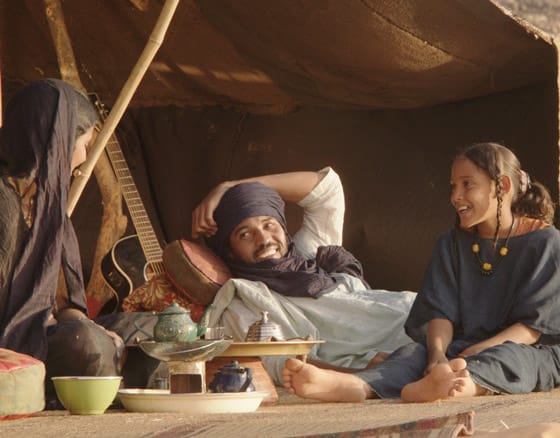About 30 minutes into Timbuktu, Abderrahmane Sissako's painfully didactic and wholeheartedly indignant depiction of the fundamentalist attack on Mali in 2012, some jihadist extremists responsible for fundamentalist bullying throughout Mali slaughter a herder's cow. The hypocrisy and symbolism is obvious. The same highly sanctimonious and arrogant men ordering around the humble denizens of the titular Timbuktu (ordering women to wear gloves, arresting people for singing and harassing a rural farmer's wife for not covering her hair), preach enlightenment while acting in a barbarous manner. Animal slaughter and the destruction of art and nature by bullets for target practice are a consistent behavioural trajectory to reiterate this crude disconnect between words and actions.
While the metaphor is effective enough, offering a very strong opinion about the antagonists without outwardly vilifying them, it's also a tad self-defeating and hypocritical in itself. Sissako, in trying to exaggerate just how animalistic these fundamentalists are, films an actual cow being speared and lets the camera capture its slow, painful death. This pornographic depiction of slaughter and death is entirely unnecessary and reflects a lack of maturity; Sissako could have easily made this point by implying what was about to occur rather than finding an animal and killing it onscreen to shock his audience with a rather gauche, adolescent tactic.
And, in a way, this vulgar emotional decision and lack of clear thinking pretty much defines much of what Timbuktu ultimately is. The actual filmmaking is competent, albeit unoriginal, conforming to the provincial aesthetic and narrative style of the region, leaving only the basic narrative and ham-fisted metaphors to tell the story. As such, the obviousness of the building conflict — tensions between jihadists and a cattle herder escalate — is entirely evident from the outset. There are no surprises here and the outcome is as predictable as the pointed juxtaposition of self-righteous preaching with violent, irrational acts.
It's not that what happened in Mali isn't a vital narrative; on the contrary, there are many powerful stories that could be woven from these events to reiterate the common international observation that unchecked religious extremism is cataclysmic. It's just that Sissako's approach is so clumsy and uninspired that it feels as though someone 40 years his junior made it. Anger can work if it has a consistent voice or some sort of unique slant, but here it's merely shaped into a standardized template and served up without much self-awareness or analysis.
As Western audiences aren't familiar enough with regional cinematic dialects, the long takes and generally flat nature of Timbuktu might be interpreted as artistic and contemplative. Similarly, the universality of the perspective and the rage means that people concerned with self-image will champion the film for basically reiterating the status quo sentiment in first world nations while making them appear worldly and "aware." It's the sort of film that people claim to like even though they found it sort of dull and spent most of the runtime itemizing their grocery list.
(Axia)While the metaphor is effective enough, offering a very strong opinion about the antagonists without outwardly vilifying them, it's also a tad self-defeating and hypocritical in itself. Sissako, in trying to exaggerate just how animalistic these fundamentalists are, films an actual cow being speared and lets the camera capture its slow, painful death. This pornographic depiction of slaughter and death is entirely unnecessary and reflects a lack of maturity; Sissako could have easily made this point by implying what was about to occur rather than finding an animal and killing it onscreen to shock his audience with a rather gauche, adolescent tactic.
And, in a way, this vulgar emotional decision and lack of clear thinking pretty much defines much of what Timbuktu ultimately is. The actual filmmaking is competent, albeit unoriginal, conforming to the provincial aesthetic and narrative style of the region, leaving only the basic narrative and ham-fisted metaphors to tell the story. As such, the obviousness of the building conflict — tensions between jihadists and a cattle herder escalate — is entirely evident from the outset. There are no surprises here and the outcome is as predictable as the pointed juxtaposition of self-righteous preaching with violent, irrational acts.
It's not that what happened in Mali isn't a vital narrative; on the contrary, there are many powerful stories that could be woven from these events to reiterate the common international observation that unchecked religious extremism is cataclysmic. It's just that Sissako's approach is so clumsy and uninspired that it feels as though someone 40 years his junior made it. Anger can work if it has a consistent voice or some sort of unique slant, but here it's merely shaped into a standardized template and served up without much self-awareness or analysis.
As Western audiences aren't familiar enough with regional cinematic dialects, the long takes and generally flat nature of Timbuktu might be interpreted as artistic and contemplative. Similarly, the universality of the perspective and the rage means that people concerned with self-image will champion the film for basically reiterating the status quo sentiment in first world nations while making them appear worldly and "aware." It's the sort of film that people claim to like even though they found it sort of dull and spent most of the runtime itemizing their grocery list.




